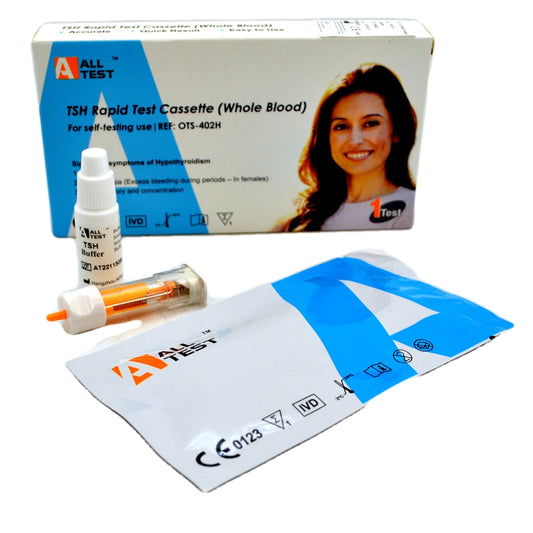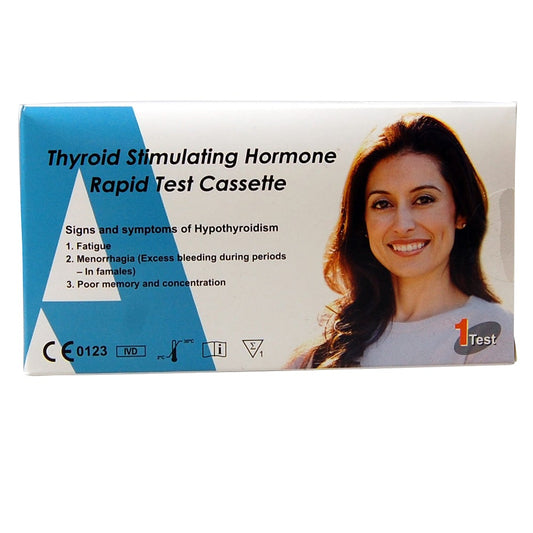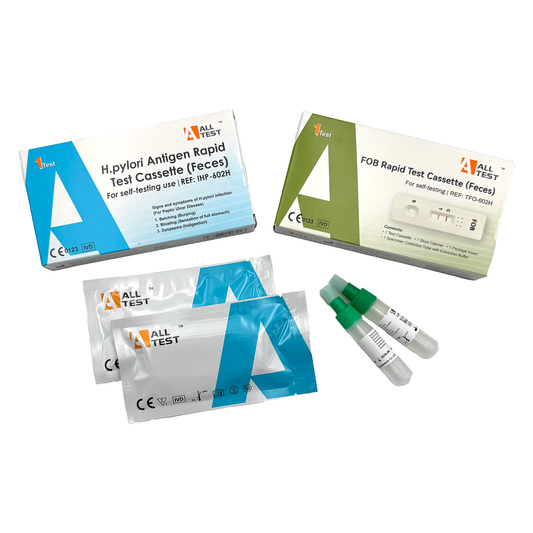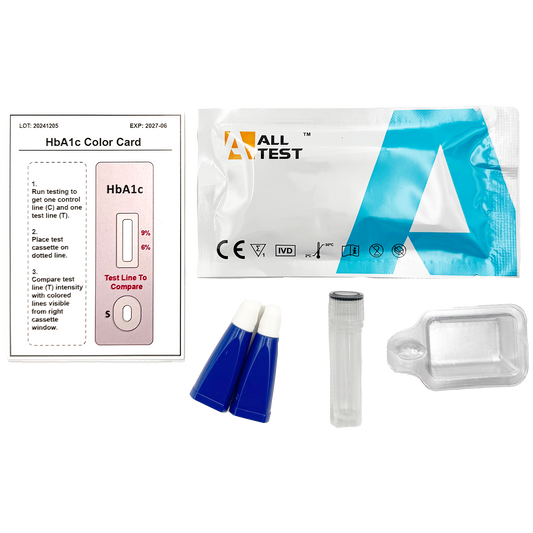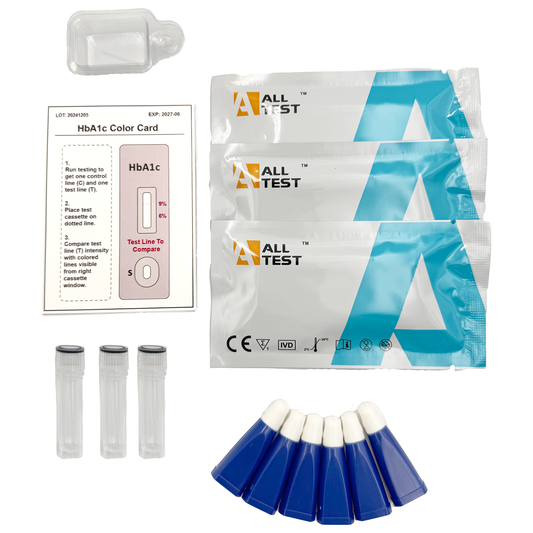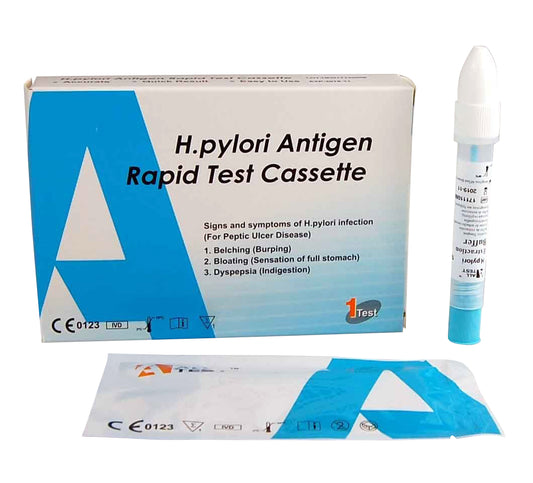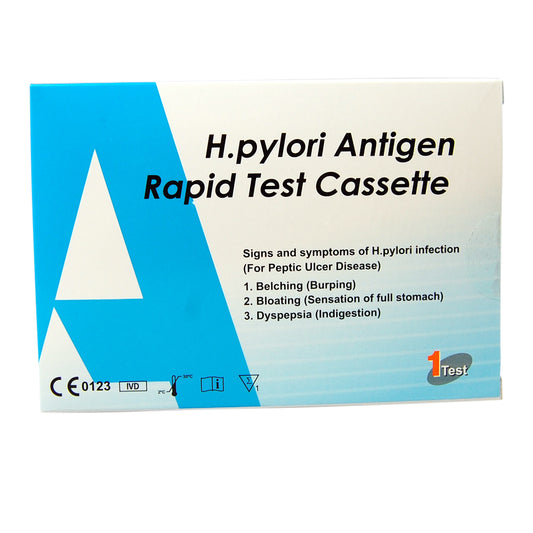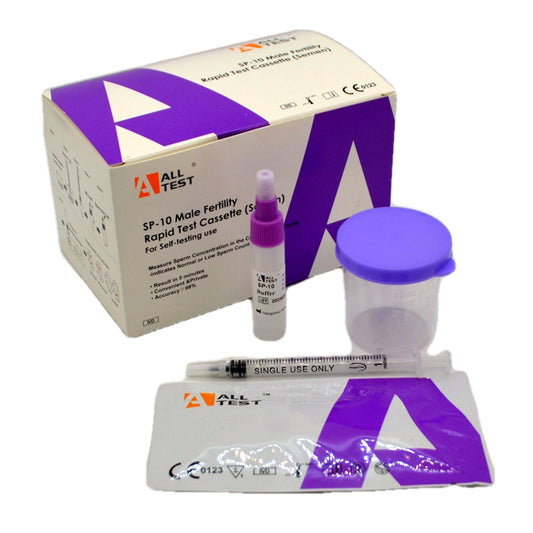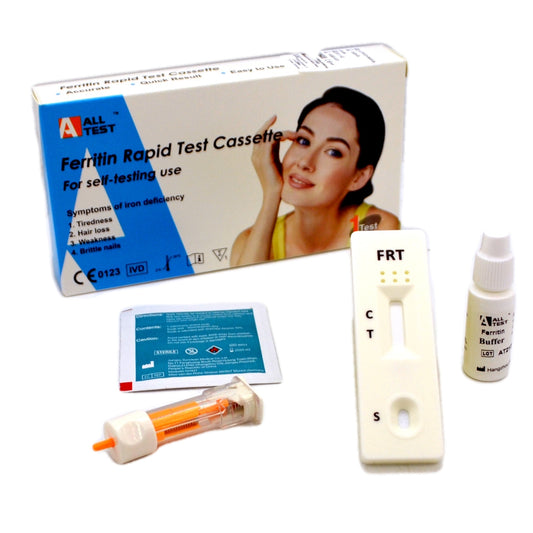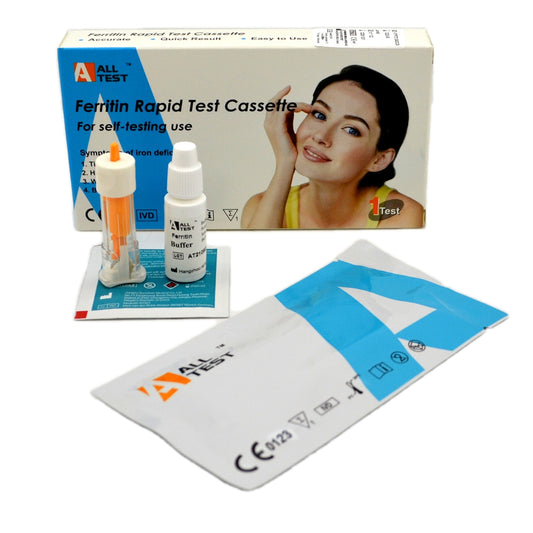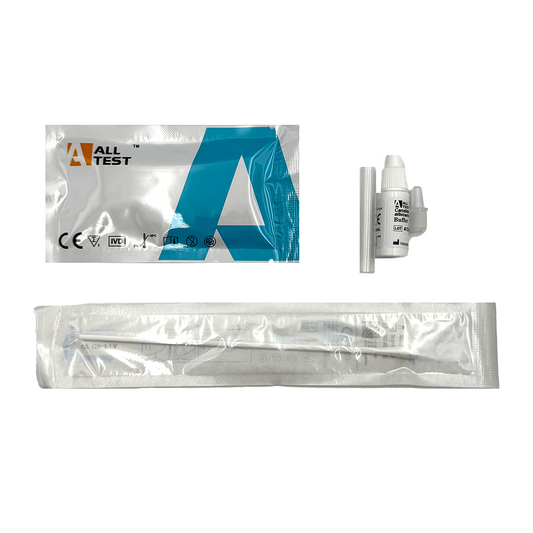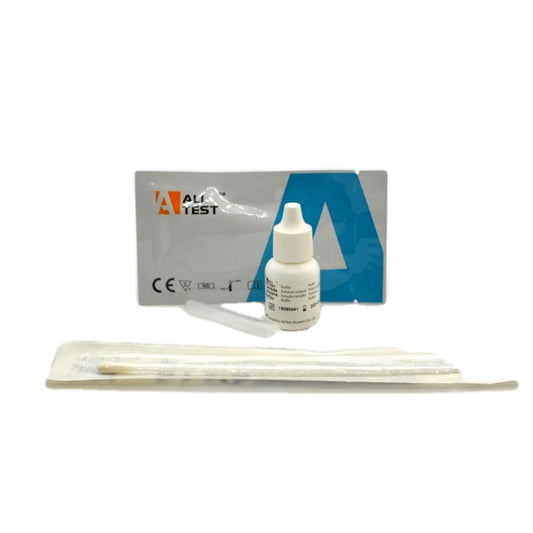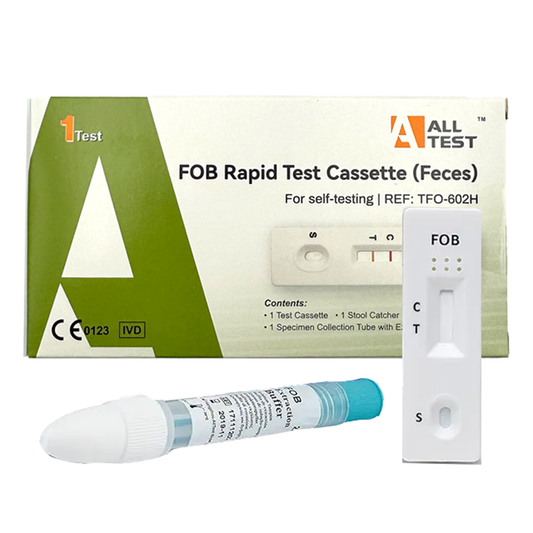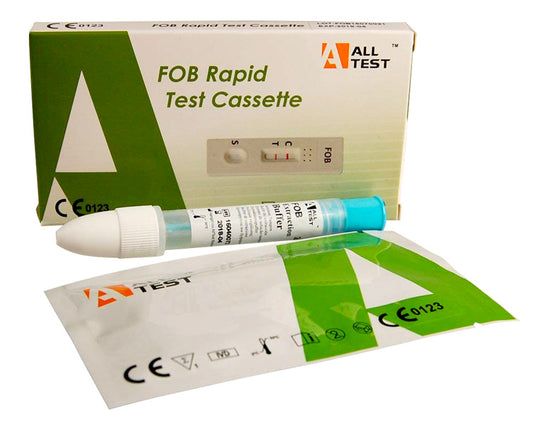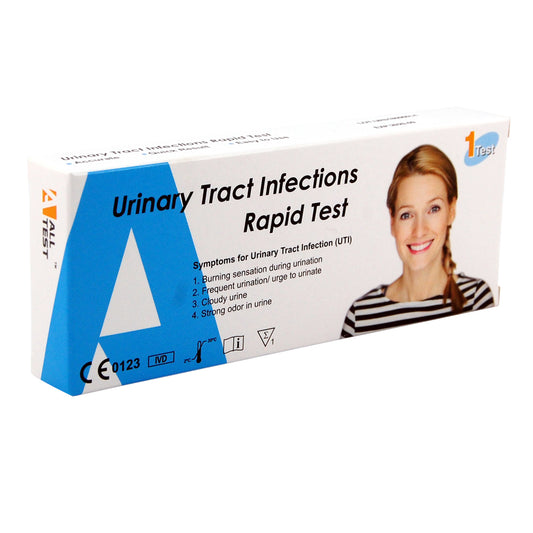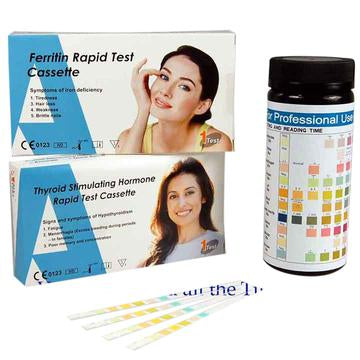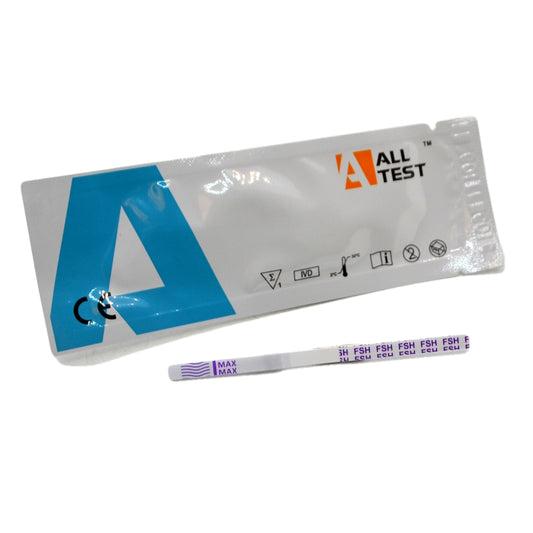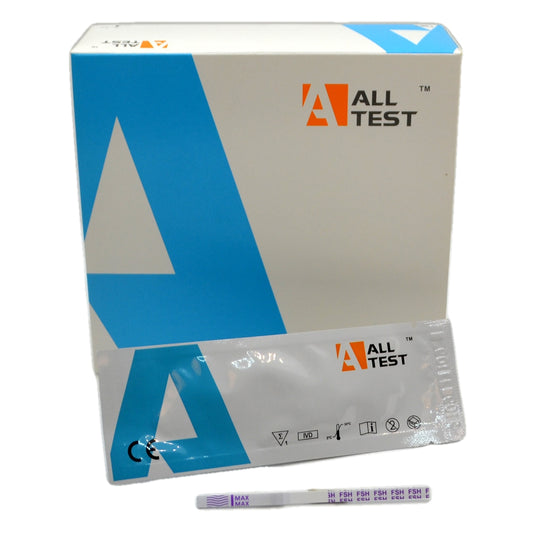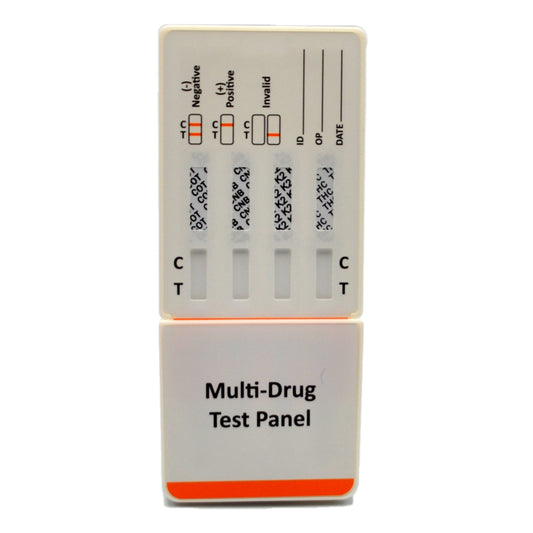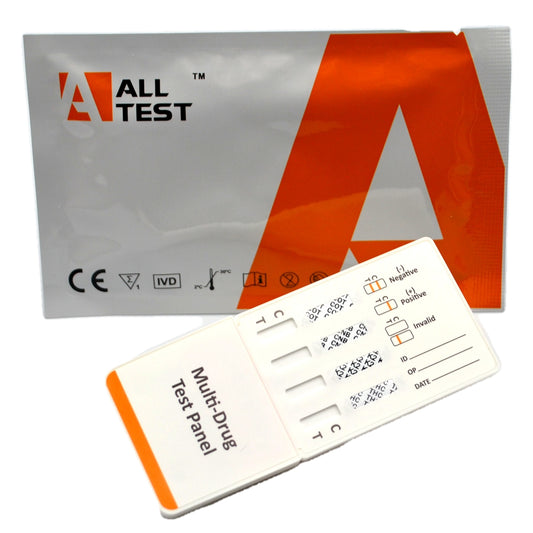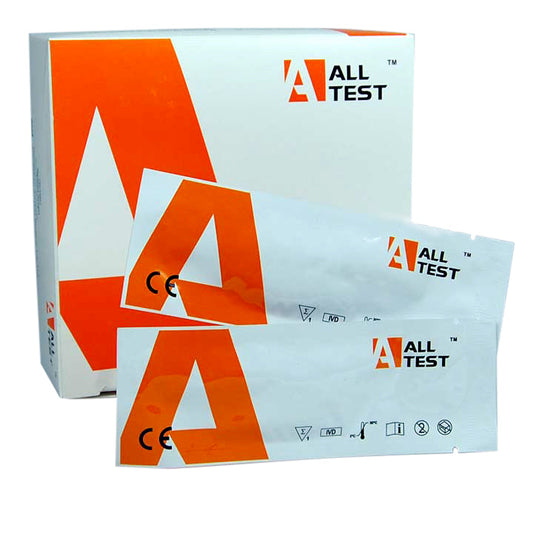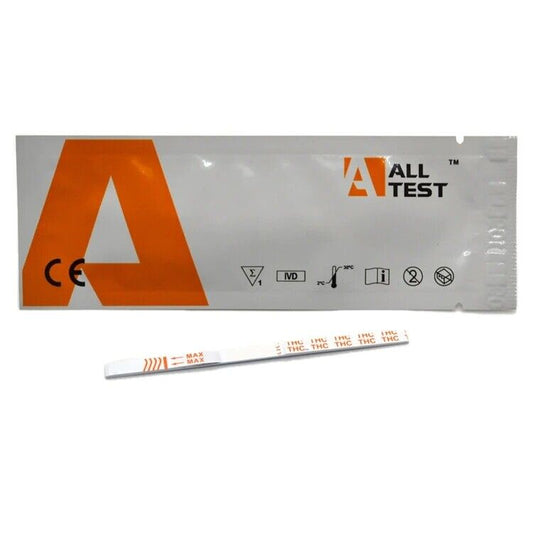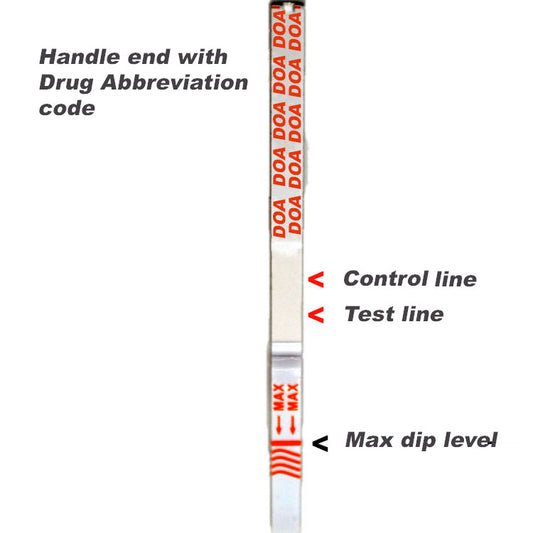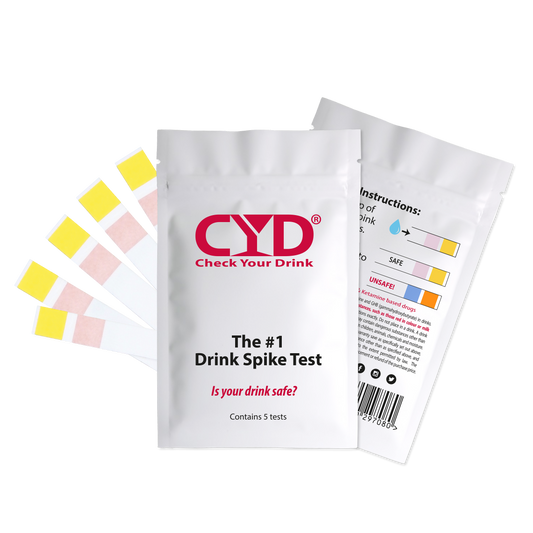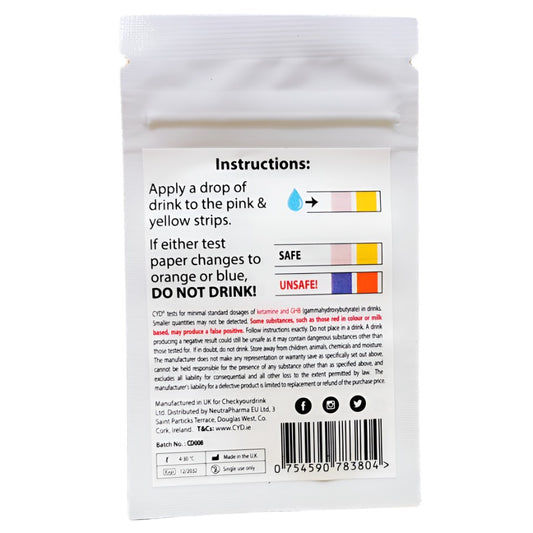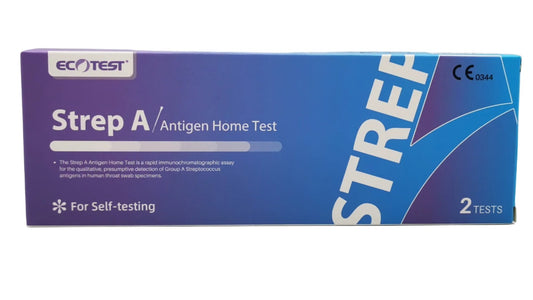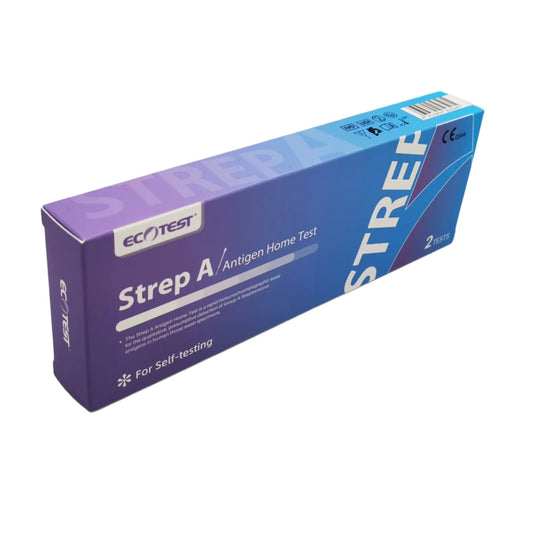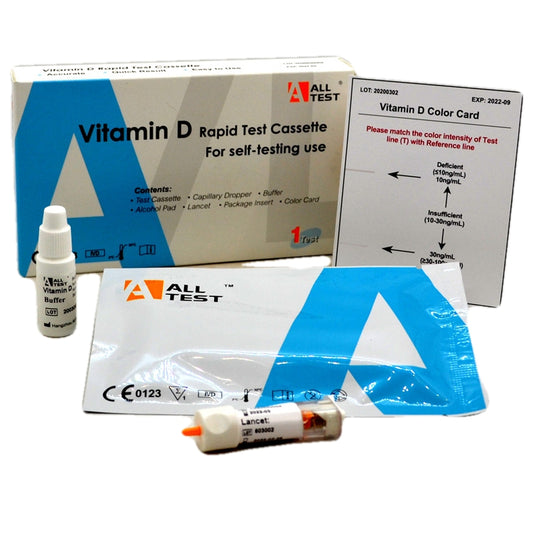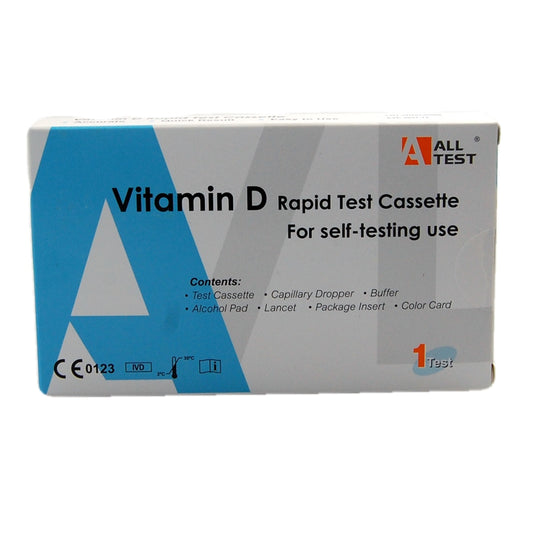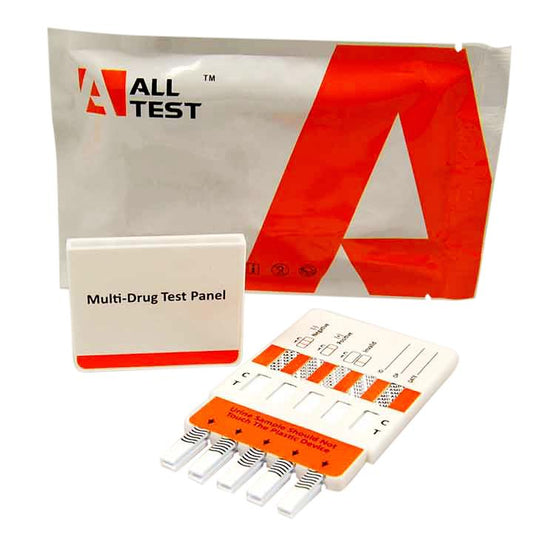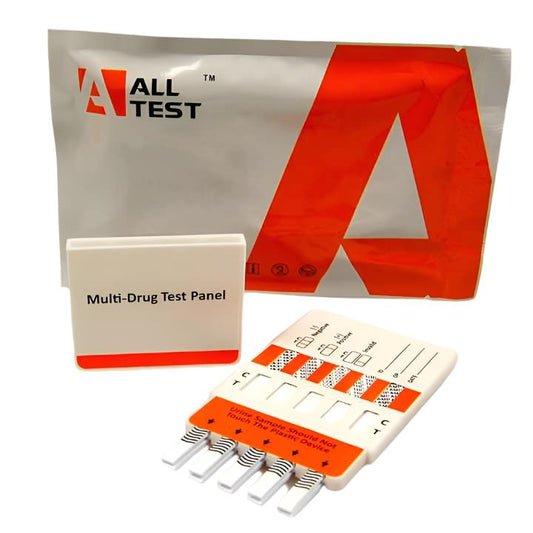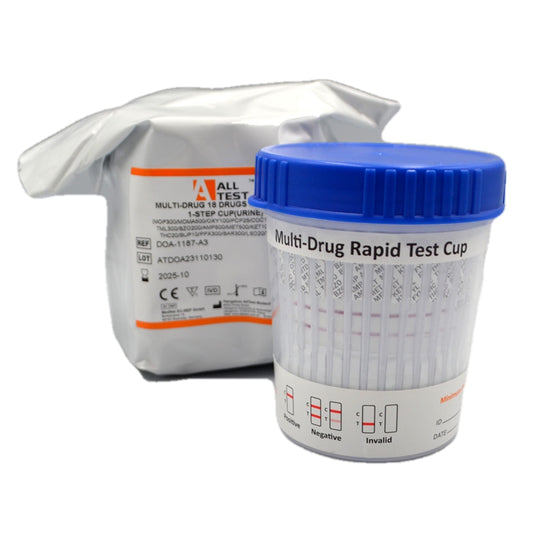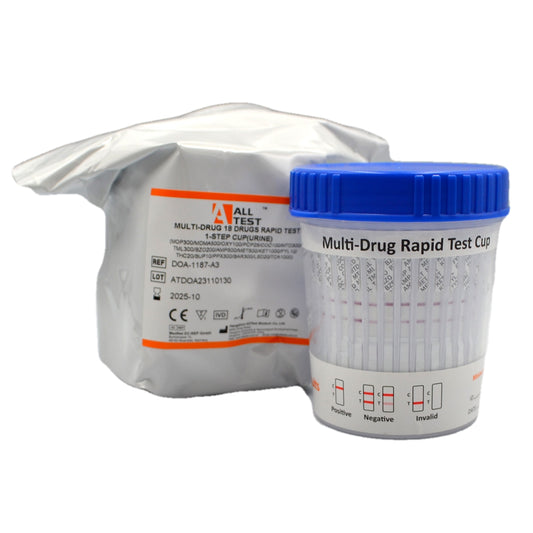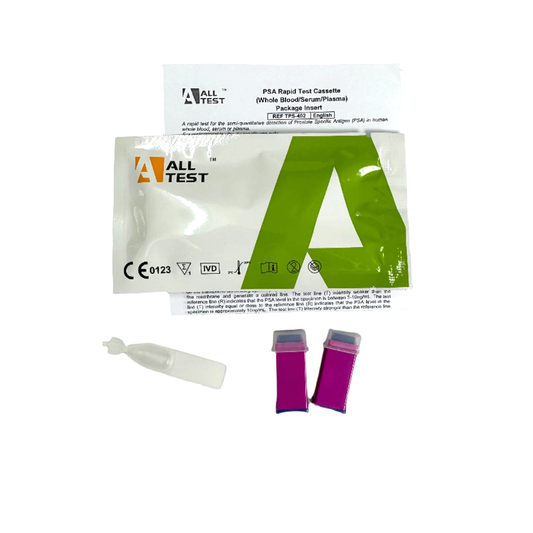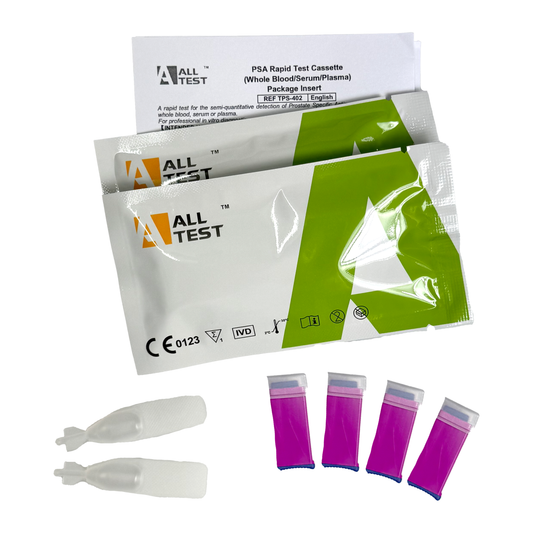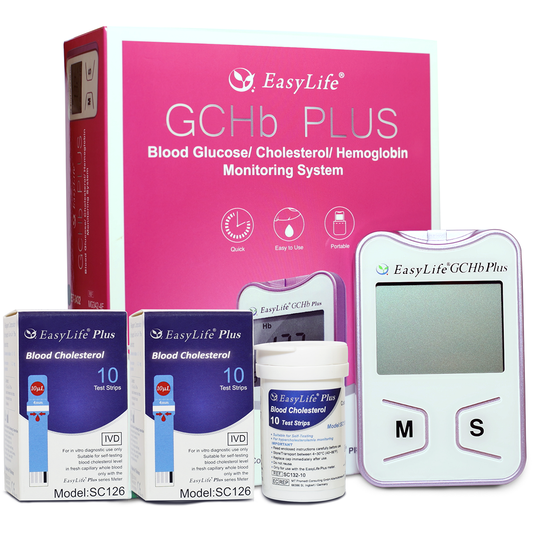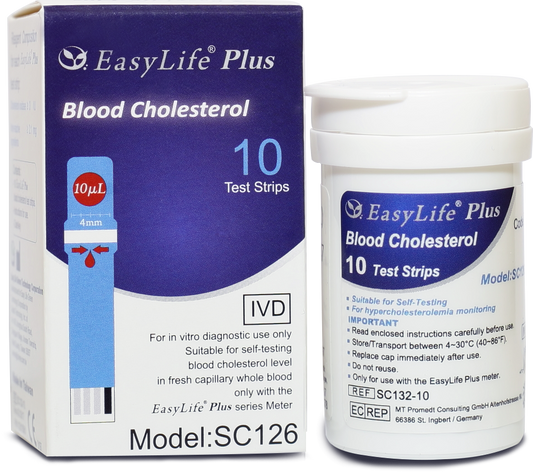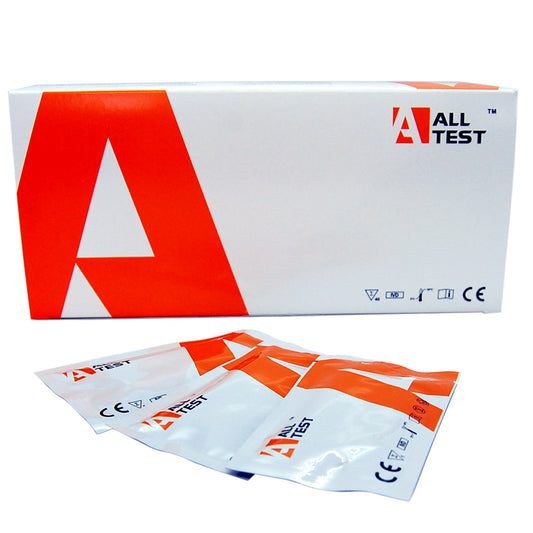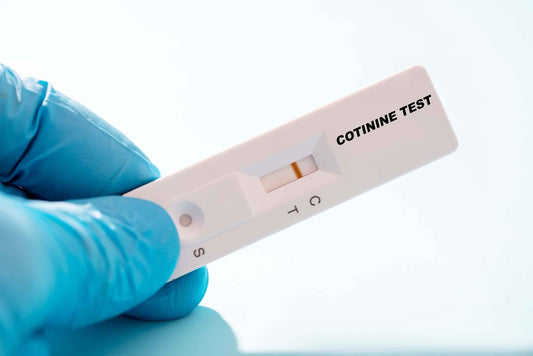Collection: Home Test Kits
Self-Testing Kits
Take control of your health with our comprehensive range of self-testing kits at ValueMed. Browse our collection today and discover how easy it is to stay informed about your health.
-
ALLTEST Thyroid Test Kit TSH Blood Test
No reviewsRegular price £4.65 GBPRegular priceUnit price / per -
Gut Health Home Testing Kit (Crohn's, IBS, Ulcers, Gastritis) ALLTEST
No reviewsRegular price £19.99 GBPRegular priceUnit price / per£24.68 GBPSale price £19.99 GBPSale -
Blood Deficiencies Home Testing Kit (Vitamin D Deficiency, Iron Deficiency, Underactive Thyroid) ALLTEST
No reviewsRegular price £12.99 GBPRegular priceUnit price / per£13.89 GBPSale price £12.99 GBPSale -
ALLTEST Diabetes & Prediabetes Home Test Kit (HbA1c Glycosylated Haemoglobin)
No reviewsRegular price From £8.99 GBPRegular priceUnit price / per -
ALLTEST H Pylori Antigen Stool Home Test Kit
4 reviewsRegular price £6.99 GBPRegular priceUnit price / per -
ALLTEST SP10 Home Male Fertility Test Kit
2 reviewsRegular price From £7.99 GBPRegular priceUnit price / per -
ALLTEST Home Ferritin Test Kit for Iron Deficiency
1 reviewRegular price £4.49 GBPRegular priceUnit price / per -
ALLTEST Candida Albicans Thrush Instant Test Kit
1 reviewRegular price From £5.95 GBPRegular priceUnit price / per -
ALLTEST Faecal Occult Blood Home Test Kit
No reviewsRegular price £4.75 GBPRegular priceUnit price / per -
ALLTEST Urine Infection Test Strip
No reviewsRegular price £3.25 GBPRegular priceUnit price / per£3.25 GBPSale price £3.25 GBP -
Tired All The Time Chronic Fatigue Test Kits
No reviewsRegular price £15.99 GBPRegular priceUnit price / per -
ALLTEST Menopause And Perimenopause Test Kit
No reviewsRegular price From £2.95 GBPRegular priceUnit price / per -
Vape Drug Test Kit
No reviewsRegular price £8.95 GBPRegular priceUnit price / per -
ALLTEST Ultrasensitive Cotinine Urine Test Strips (Smoking/ Vaping Nicotine Test )
1 reviewRegular price From £5.75 GBPRegular priceUnit price / per -
Vape Test Kit
No reviewsRegular price £9.99 GBPRegular priceUnit price / per -
CYD Check Your Drink Strips
No reviewsRegular price £5.95 GBPRegular priceUnit price / per -
ECOTEST Strep A Home Test Kits for Self-Testing 2 Test pack
No reviewsRegular price £9.99 GBPRegular priceUnit price / per -
ALLTEST Vitamin D Test Kit For Self Testing
No reviewsRegular price From £4.75 GBPRegular priceUnit price / per -
ALLTEST 7 Panel Ultra Sensitive New Club Drugs Urine Multi Drug Test Kit
No reviewsRegular price From £3.45 GBPRegular priceUnit price / per -
ALLTEST 18 Panel Urine Cup Multi Drug Test Kit
No reviewsRegular price From £11.99 GBPRegular priceUnit price / per -
ALLTEST Mens Prostate Cancer Self Testing Kit (PSA)
1 reviewRegular price £5.95 GBPRegular priceUnit price / per£5.95 GBPSale price £5.95 GBP -
EASYLIFE Plus Total Home Cholesterol Testing Kit + 20 Cholesterol Tests
No reviewsRegular price £68.58 GBPRegular priceUnit price / per -
ALLTEST Ultrasensitive Cotinine Urine Test Kits (Smoking/ Vaping Nicotine Test) Cassette
No reviewsRegular price From £5.99 GBPRegular priceUnit price / per
Home self-test kits
Designed to provide quick, reliable, and convenient results, our test kits empower you to monitor and manage your well-being from the comfort of your home. Whether you're looking to check for common health conditions, track specific health metrics, or gain peace of mind, our self-test kits are simple to use and deliver accurate insights.
Valuemed is a medical supply company that provides a variety of diagnostic testing kits, including home test kits, which can be used to monitor and diagnose various health conditions from the comfort of your own home.
Our aim is to empower individuals to proactively manage their healthcare through preventative testing. Knowledge is empowering! Our tests are designed to be convenient, allowing you to take control of your health on your own terms. With fast and easily interpretable results, you can obtain accurate diagnoses early, enabling you to seek medical advice and treatment promptly.
These home test kits are designed to be user-friendly, accurate, and convenient, making them an ideal solution for people who want to take control of their health and screen for or monitor chronic health conditions.
Valuemed's home health testing kits cover a wide range of health concerns including:
- Diabetes
- Cholesterol
- Fertility
- Anaemia
- Gout
- Infectious diseases
- Under active thyroid
- Pregnancy
- Drug testing
- Urinary tract infections.
- Vitamin and mineral deficiencies
The test kits offer reliable and accurate results that can be obtained in just a few minutes. One of the key benefits of using home test kits from Valuemed is that they can help you save time and money by screening for common medical conditions quickly and affordably, and can help speed up diagnosis. They can also help with the long-term management of chronic conditions like diabetes, elevated cholesterol and gout. This is especially important for people who have busy schedules or who live in remote areas.
Are home test kits easy to use?
The testing process is also quite simple. Most of the home test kits and medical meters come with detailed instructions and all the necessary components to conduct the test at home. For example, the diabetes test kit comes with a glucose meter, test strips, and a lancing device to collect a blood sample. Similarly, the Thyroid test kit contains everything you need to perform the underactive thyroid screening test at home on how to collect a sample from the affected area. Valuemed's home test kits are designed to be highly accurate, and the results are easy to read and interpret. If you have any concerns or questions about the test results, you can always consult our customer support team for further advice.
We have an extensive range of home test kits and medical test meters for self-testing, all of which we have thoroughly evaluated and tested ourselves for medical conditions including:
- Vitamin D level home test kit
- Male fertility home test kits
- Urine infection home test kit
- FOB bowel health test kit
- H Pylori antigen stool home test kit
- Vaginal ph home test kit
- Underactive thyroid home test kit
- Tired all the time TATT home test kits
- Blood ferritin iron level home test kit
- Urinary tract infection home test kits
- Home drug test kits
- Menopause test kit
- Candida Albicans (Thrush) Test kit
- SP10 male fertility test kit
- Cotinine (smoking and vaping) urine test kit
- Cholesterol test kit
- Diabetes test kits and glucose meters
- Haemoglobin test kits and meters
- Ketone test kits and meters
- Ovulation test kits
- Pregnancy test kits
- Fertility test kits
- Strep A test kits
If you are unable to find the home test kit that you require use the search bar or contact our customer support team for assistance.
How accurate are home test kits?
The accuracy of home test kits can vary widely depending on the type of test, the manufacturer, and how well the test is performed. Here are some factors to consider when assessing the accuracy of home test kits:
- Type of test kit: The accuracy of a home test kit can vary depending on the type of test it is designed for. Some tests, like pregnancy tests, tend to be highly accurate, while others may have lower accuracy rates.
- Manufacturer: The reputation and reliability of the manufacturer can play a significant role in the accuracy of the test kit. It's generally a good idea to choose products from well-established and reputable companies.
- Proper usage: Accurate results depend on following the instructions provided with the home test kit. Failure to read the instructions or to use the test kit correctly can lead to false results. Be sure to read and follow the instructions carefully and read the test kit results at the correct time.
- Sample collection: Many home tests rely on the collection of bodily fluids (e.g., blood, urine, saliva, or stool). Proper sample collection is essential for accurate results.
- Sensitivity and specificity: Look for information on the home test's sensitivity and specificity. Sensitivity refers to the test's ability to correctly identify those with the condition, while specificity is the ability to correctly identify those without the condition. Higher sensitivity and specificity values generally indicate a more accurate test.
- Timing: For some home test kits, the timing of when you take the test can affect accuracy. For example, home pregnancy tests may be more accurate if taken after a missed period and if taken first thing in the morning when the urine is most concentrated.
- Calibration and quality control: Some home test kits like digital breathalysers and blood glucose meters require regular calibration or quality control checks to ensure accuracy. Make sure to follow the recommended maintenance procedures.
- Test limitations: Understand the limitations of the home test kit. Some health conditions may require confirmation by a healthcare professional through more advanced testing methods. For example a raised PSA level on a test kit is an indicator that prostate disease may be present but further tests will be required by your healthcare provider to establish the cause of the raised level.
- Regulatory approval: Check whether the test kit has been approved by a regulatory authority, such as a CE mark in Europe or by the Food and Drug Administration (FDA) in the United States or similar agencies in other countries. Regulatory approval can provide some assurance of quality and accuracy.
- False positives and false negatives: Keep in mind that no test kit is perfect, and there is always the possibility of false positives (the test indicates a condition that is not present) or false negatives (the test fails to detect a condition that is present).
Collapsible content
Can the kit be reused?
No, the home test kit cannot be reused. It is designed for single use only to ensure accuracy, hygiene, and reliability of the results. Each kit includes all the components needed for one test.
After completing the test, all used components should be safely disposed of, following the instructions provided in the kit. If you need to repeat the test again in the future, you’ll need to purchase a new test kit.
How long does the Thyroid test take?
The Thyroid test takes approximately 10 minutes to complete from start to finish.
Here’s a quick breakdown:
- Preparation: Setting up the kit takes just a couple of minutes.
- Blood Collection: Using the lancet to collect a small blood sample is quick and straightforward.
- Testing Process: Once the blood sample is added to the test cassette with the buffer solution, the result will appear in about 10 minutes.
The instructions included in the Thyroid test kit are clear and easy to follow, ensuring a smooth and efficient testing process.
How should the test kits be stored?
Store in a cool, dry place away from direct sunlight or extreme temperatures to maintain effectiveness.
How long does it take to get results?
Results are usually available within minutes, making these test kits suitable for quick assessments.

